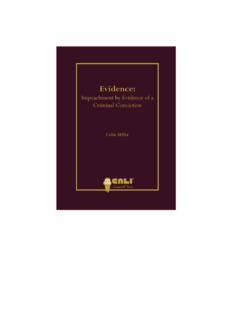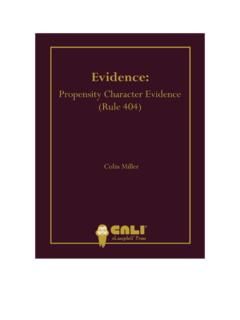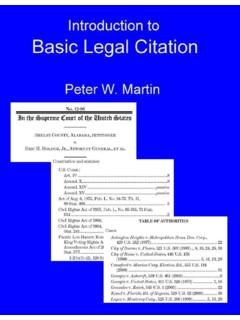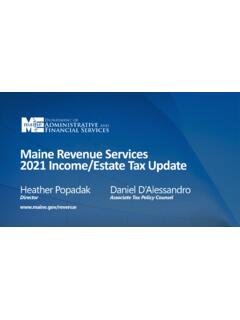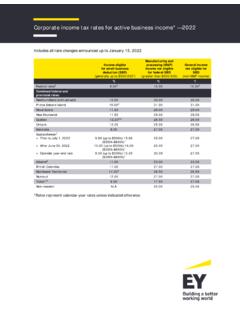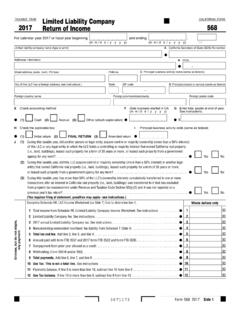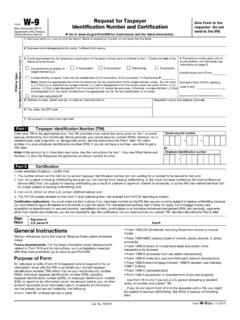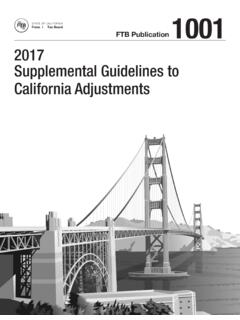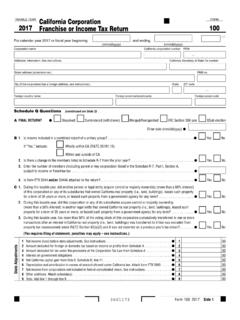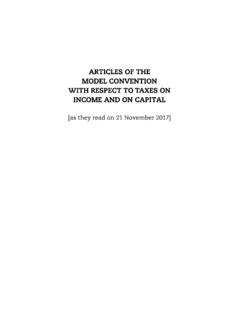Transcription of Basic Income Tax 2016-2017 Fourth Edition - CALI
1 Basic Income Tax 2016 - 2017 Fourth Edition William Kratzke Professor of Law The University of Memphis CALI eLangdell Press 2016 ii About the Author Professor William Kratzke is a Cecil C. Humphreys Professor of Law at the Uni-versity of Memphis. He received his in Political Science and the Far Eastern & Russian Institute from the University of Washington in 1971. This naturally caused him to be interested in attending law school. He received his from Valparaiso University in 1974 and was a member of the Valparaiso University Law Review s editorial board. He received his from Georgetown Universi-ty in 1977.
2 Professor William Kratzke teaches tax law courses at the University of Memphis. He has been a faculty member there since 1979. He has taught courses across the curriculum. In addition to tax courses, he has taught trademarks, torts, civil pro-cedure, world trade law, economic analysis, and other courses. He visited Santa Clara University and the University of Mississippi. He received Fulbright Teach-ing Awards in 1997 (Moldova) and 2001-2002 (Russia). Professor Kratzke has written in the areas of tax law, trademark law, tort law, and antitrust law. iii Notices This is the Fourth Edition of this casebook, updated June 27, 2016 .
3 Visit for the latest version and for revision history. This work by William Kratzke is licensed and published by CALI eLangdell Press under a Creative Commons Attribution-NonCommercial-ShareAlike Unport-ed License. CALI and CALI eLangdell Press reserve under copyright all rights not expressly granted by this Creative Commons license. CALI and CALI eLang-dell Press do not assert copyright in US Government works or other public do-main material included herein. Permissions beyond the scope of this license may be available through In brief, the terms of that license are that you may copy, distribute, and display this work, or make derivative works, so long as you give CALI eLangdell Press and the author credit; you do not use this work for commercial purposes; and you distribute any works derived from this one under the same licensing terms as this.
4 Suggested attribution format for original work: William Kratzke, Basic Income Tax 2016 - 2017 , Published by CALI eLangdell Press. Available under a Creative Commons BY-NC-SA License. CALI and eLangdell are United States federally registered trademarks owned by the Center for Computer-Assisted Legal Instruction. The cover art design is a copyrighted work of CALI, all rights reserved. The CALI graphical logo is a trademark and may not be used without permission. Should you create derivative works based on the text of this book or other Crea-tive Commons materials therein, you may not use this book s cover art and the aforementioned logos, or any derivative thereof, to imply endorsement or other-wise without written permission from CALI.
5 Iv This material does not contain nor is intended to be legal advice. Users seeking legal advice should consult with a licensed attorney in their jurisdiction. The edi-tors have endeavored to provide complete and accurate information in this book. However, CALI does not warrant that the information provided is complete and accurate. CALI disclaims all liability to any person for any loss caused by errors or omissions in this collection of information. The author wishes to express thanks to his research assistants, Magdalene Smith and Jay Clifton. v About CALI eLangdell Press The Center for Computer-Assisted Legal Instruction (CALI ) is: a nonprofit or-ganization with over 200 member US law schools, an innovative force pushing legal education toward change for the better.
6 There are benefits to CALI member-ship for your school, firm, or organization. ELangdell is our electronic press with a mission to publish more open books for legal education. How do we define "open?" Compatibility with devices like smartphones, tablets, and e-readers; as well as print. The right for educators to remix the materials through more lenient copy-right policies. The ability for educators and students to adopt the materials for free. Find available and upcoming eLangdell titles at Show support for CALI by following us on Facebook and Twitter, and by telling your friends and colleagues where you received your free book.
7 Vi Preface This book is a Basic Income tax text. I intend this text to be suitable for a three-hour course for a class comprised of law students with widely different back-grounds. Certain principles permeate all of tax law. I have found that certain axioms or principles will carry us a long way. For example, Income is taxed once or treat-ed as if it has been taxed. Once it has been taxed, its investment gives the taxpayer basis which I define not as cost but as money that will not be subject to tax again. Etc. The text returns to these principles throughout.
8 I usually put these matters in text boxes. At a minimum, I want students who have completed Basic Income tax to know these principles and to be able to apply them, , to develop some tax intuition. This intuition will serve well the student who wishes to take more tax classes. I tried to identify what I want students to know before enrolling in corporate tax or partnership tax and to make certain that I covered these principles in the Basic course. Such intuition will also serve well the student for whom the Basic course is a one and done experience. Like it or not, tax law affects most legal topics, and such intuition should at least give students working in other areas of the law an idea of when it is time to ask questions concerning lurking tax issues.
9 At the end of every chapter, I have included a short section entitled What have you learned? This page may be examined before beginning the study of a chap-ter. I intend it to be a statement of learning objectives: a student should have a solid understanding of the items listed. In some areas, I have relied heavily on the CALI drills by Professor James Ed-ward Maule (Villanova University). These drills both review and, in some in-stances, teach a little substance. Each zeroes in on a specific topic and should take a student about twenty minutes to complete if she has adequately prepared to do the drill.
10 Of course, students can work through such drills at their own speed. I have tried to make this text very readable so that students can easily under-stand. I have aimed at law students who know they have no interest in Income tax but who may find that they in fact have a considerable interest in tax law. With my political science background, I was such a student. I am proof that one vii does not have to have an accounting background to find Income tax law both im-portant and interesting. Additionally, Magdalene Smith and Jay Clifton III were two such students; they assisted me greatly in making this text as accessible as possible to all law students.
